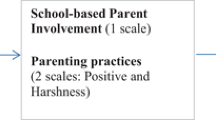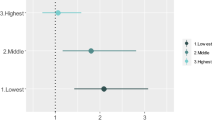Abstract
This study examined the impact of financial, cultural, and family variables on the incidence of behavioral and emotional problems in a group of two- and three-year-old Latino children. The vulnerability of these children to mental health problems stems from the many challenges faced by their families, especially those associated with acculturation and poverty. Results indicate that most problems experienced by the children were related to depression and social withdrawal. Children were at greatest risk whose parents had immigrated from Central America, whose families relied more extensively on internal coping strategies such as passive resignation, and whose parents were dissatisfied with their family's interactions.
Similar content being viewed by others
References
Montgomery E, Krogh Y, Jacobsen A, Lukman B: Children of torture victims: Reactions and coping. Child Abuse and Negl 16: 797–805, 1992.
Rogler LH, Malgady RG, Constantino G Blumenthal, R: What do culturally sensitive mental health services mean? Am Psychol 24: 565–570, 1987.
Bullrich S: The process of immigration. In Children in family contexts: Perspectives on treatment, 482–501, ed. Combrinck-Graham L. New York: Guilford Press, 1989.
Bylund M: Women in exile and their children. Women and Therapy 13: 53–63, 1992.
Mendes de Leon C, Markides K: Depressive symptoms among Mexican-Americans: A three generation study. Am J Epidemiol 127(1): 150–160, 1988.
Vega WA, Kolody B, Valle JR: Migration and mental health: An empirical test of depression risk factors among Mexican-American women. International Migration Review 21:512–530, 1987.
Romero A: The Mexican-American child: A sociological approach to research. In: The psychosocial development of minority group children, 538–572, ed. Powell GJ. New York: Brunner/Mazel, 1983.
Trankina FJ: Clinical issues and techniques in working with Hispanic children and their families. In: The psychosocial development of minority group children, 307–329, ed. Powell GJ. New York: Brunner/Mazel, 1983.
Achenbach TM, Edelbrock C, Howell CJ: Empirically based assessment of the behavioral/emotional problems of 2-and 3-year-old children. J Abnorm Child Psychol 15(4): 629–650, 1987.
Marin G, Sabogal F, Marin B, Otero-Sabogal R Perez-Stable, E: Development of a short acculturation scale for Hispanics. Hispanic J Behavioral Sci 9(2): 183–207, 1987.
Olson DH: Circumplex model VIII: Validation studies and FACES III. Fam Process 25(3): 337–351, 1986.
Edman SO, Cole DA, Howard GS: Convergent and discriminant validity of FACES-III: Family adaptability and cohesion. Fam Process 29: 95–103, 1990.
Olson, DH: Three dimensional circumplex model and revised scoring of FACES-III. Fam Process 30(1): 74–79, 1991.
Knight G, Tien J, Shell R, Roosa M: The cross-ethnic equivalence of parenting and family interaction measures among Hispanic and Anglo-American families. Child Dev 63: 1392–1403, 1992.
Vega WA, Patterson T, Sallis J, Nader P, Atkins C, Abramson L: Cohesion and adaptability in Mexican-American and Anglo families. J Marriage Fam 48: 857–867, 1986.
Weiss S: Adjustment of young Central American families who have emigrated to the U.S. Presentation at the U.S.-El Salvador Colloquium on Family Health. University of El Salvador, San Salvador, 1992, September.
McCubbin H, Larsen A, Olson D: Family crisis oriented personal evaluation scales. In: Family inventories. eds. Olson D, McCubbin H, Barnes H, Larsen A, Muxen M, Wilson M. St. Paul, MN: Family Social Science, University of Minnesota, 1982.
McCubbin H, Thompson A: Family assessment inventories for research and practice (2nd ed.). Madison: University of Wisconsiin, 1991.
Olson DH, Wilson M: Family satisfaction. In: Family Inventories, ed. Olson D. St. Paul, MN: University of Minnesota, 1982.
Daley J, Sowers-Hoag K, Thyer B: Are FACES-II ‘family satisfaction’ scores valid? J Fam Therapy 12(1): 77–81, 1990.
Olson DH, McCubbin H: Families: What makes them work. 171–186. Beverly Hills: Sage. 1983.
Aronowitz M: The social and emotional adjustment of immigrant children: A review of the literature. International Migration Review 18:237–257, 1984.
Eisenbruch M: The mental health of refugee children and their cultural development. International Migration Review 22(2):282–301, 1988.
Cervantes RC, Salgado de Snyder VN, Padilla AM: Posttraumatic stress in immigration from Central America and Mexico. Hospital Comm Psychiatry 40(6): 615–619, 1989.
Salgado de Snyder VN: The role of ethnic loyalty among Mexican immigrant women. Hispanic J Behavioral Sci 9(3): 287–298, 1987.
Belsky J, Fish M, Isabella R: Continuity and discontinuity in infant negative and positive emotionality: Family antecedents and attachment consequences. Dev Psychol 27(3): 421–431, 1991.
Buriel R, Mercado R, Rodriguez J Chavez J: Mexican American disciplinary practices and attitudes toward child maltreatment: A comparison of foreign and native-born mothers. Hispanic J Behavioral Sci 13(1): 78–94, 1991.
Tronick E, Field T: Maternal depression and infant disturbance. San Francisco: Jossey-Bass, 1986.
Williams C, Berry J: Primary prevention of acculturative stress among refugees. Am Psychol 46(6): 632–641, 1991.
Westermeyer J: Migration and psychopathology. In: Refugee mental health in resettlement countries, 113–130, eds. Williams CL, Westermeyer J. Washington, D.C.: Hemisphere, 1986.
Drell M, Siegal C, Gaensbauer T: Post-traumatic stress disorder. In: Handbook of infant mental health, 120–142, ed. Zeanah C. New York: Guilford Press, 1993.
Weile B, Wingender LB, Bach-Mortensen N, Busch P, Lukman B, Holzer KI: Behavioral problems in children of torture victims: a sequel to cultural maladaption or to parental torture? J Dev Behav Pediatr 11(2): 79–80, 1990.
Farias PJ: Emotional distress and its socio-political correlates in Salvadoran refugees: Analysis of a clinical sample. Cult Med Psychiatry 15: 167–192, 1991.
Siefer R, Dickstein S: Parental mental illness and infant development. In: Handbook of infant mental health, 120–142, ed. Zeanah C. New York: Guilford Press, 1993.
Comas-Díaz L: Hispanic/Latino communities: Psychological implications. J Training & Practice Professional Psychol 41(1): 14–35, 1990.
Ross CE, Mirowsky J, Lockerman WC: Social Class, Mexican culture, and fatalism: Their effects on psychological distress. Am J Comm Psychol 11: 383–399, 1983.
Zayas LH: Hispanic family ecology and early childhood socialization: Health care implications. Fam Syst Med 12: 315–325, 1994.
Craine MH, Hanks R, Stevens H: Mapping family stress: The application of family adaptation theory to post-traumatic stress disorder. Am J Family Theory 20: 195–203, 1992.
Fendrich M, Warner V, Weissman M: Family risk factors, parental depression, and psychopathology in offspring. Dev Psychol 26(1): 40–50, 1990.
Rotter JB: Generalized expectancies for internal versus external control of reinforcement. Psychol Monogr 80(1, Whole No. 609). 1966.
Peterson C, Maier S, Seligman M: Learned helplessness: A theory for the Age of Personal Control. New York: Oxford University Press, 1993.
Goldberg W, Easterbrooks M: The role of marital quality in toddler development. Child Dev 20:504–515, 1984.
Cummings J, Pellegrine D, Notarius C, Cummings E: Children's responses to angry adult behavior as a function of marital distress and history of interparent hostility. Child Dev 60:1035–1043, 1989.
Cervantes J, Ramírez O: Spirituality and family dynamics in psychotherapy with Latino children. In: Working with culture: Psychotherapeutic interventions with ethnic minority children and adolescents, 103–128, eds. Vargas L, Koss-Chiono J. San Francisco: Jossey-Bass, 1992.
Author information
Authors and Affiliations
Rights and permissions
About this article
Cite this article
Weiss, S.J., Goebel, P., Page, A. et al. The Impact of Cultural and Familial Context on Behavioral and Emotional Problems of Preschool Latino Children. Child Psychiatry Hum Dev 29, 287–301 (1999). https://doi.org/10.1023/A:1021397032359
Issue Date:
DOI: https://doi.org/10.1023/A:1021397032359




